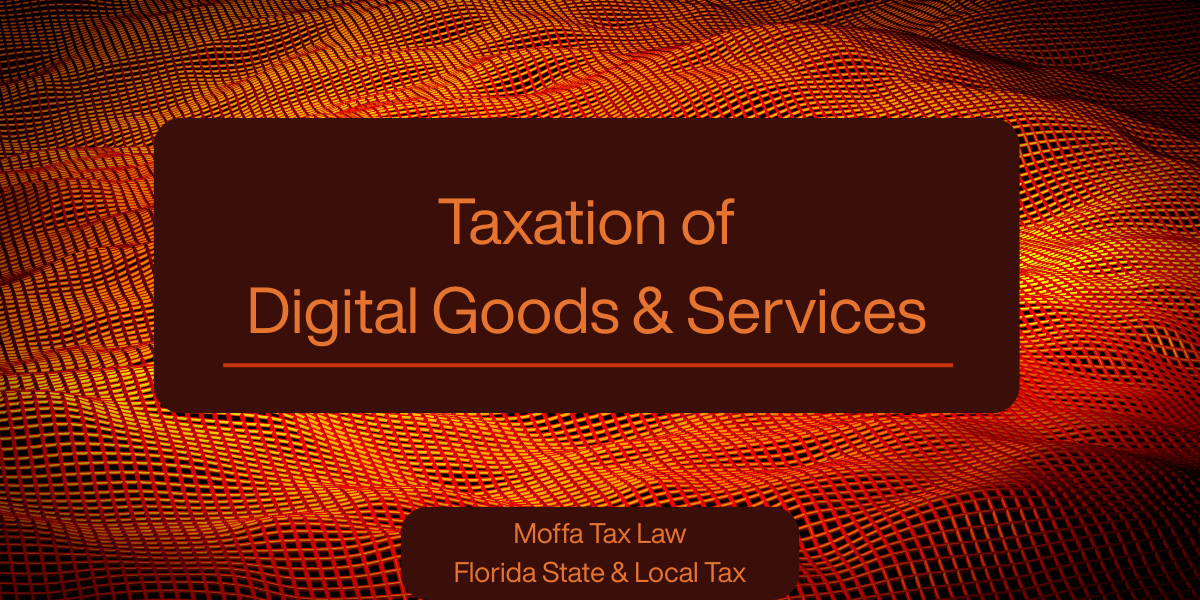NEWS & INSIGHTS


The MTC Digital Products Project: ABA SALT Committee Urges Caution in May 2025 Report
In its May 2025 Vice Chair Report, the ABA State and Local Tax (SALT) Committee raised serious concerns with the Multistate Tax Commission’s (MTC) ongoing Digital Products Project. While the project aims to provide a uniform definition of “automated digital products” for sales tax purposes, the ABA Task Force recommends further analysis before states move forward with implementation.
🔍 Background: MTC’s Goal
The MTC’s Definition Study Group is crafting a model statute defining “automated digital products” that states could adopt to expand their sales and use tax base. The working definition includes software, services, or digital rights delivered in binary format with minimal human intervention. A related business-use exemption is also proposed.
⚖️ ABA Task Force: Our Role Is Guidance, Not Endorsement
The Task Force emphasizes that it does not support or oppose expanding the sales tax base. Its purpose is to guide drafters by identifying unintended consequences and legal vulnerabilities in the current proposal.
🚩 Key Concerns Identified
- Vague Language: Terms like “binary format” and “minimal human intervention” are undefined and impractical for real-world application.
- ITFA Preemption Ignored: The Internet Tax Freedom Act (ITFA) prohibits taxation of certain digital services, yet the MTC proposal provides no statutory allowance for federal preemption—only vague references to guidance.
- No Plan for Implementation: Unlike international efforts, the MTC framework lacks transitional or administrative infrastructure, potentially creating chaos for both taxpayers and state agencies.
📄 The Draft Definition
The MTC’s proposed statutory language defines an “automated digital product” as a software or service offered in a binary format that can be replicated with little human effort. A business-use exemption applies if the product is used predominantly in a trade or business. The goal is to reduce pyramiding, but states would require customers to self-certify exempt use.
🧩 Administrative Complexity and Bundling Problems
The ABA warns that bundling rules will need serious revision. For instance, a single transaction involving both automated and non-automated services could lead to unintentional taxability unless state law clearly distinguishes them. Further, there are sourcing and exemption documentation concerns that remain unaddressed.
🌐 International Frameworks as References
The proposal borrows language from the UN Model Convention and OECD’s Pillar One Blueprint. However, these frameworks assume greater administrative coordination than currently exists among U.S. states.
🔮 Future-Proofing or Future Problems?
While the definition could potentially grow the sales tax base—especially with AI-driven services—it also opens the door to misclassification and litigation. As AI accelerates automation, the line between “minimal human effort” and traditional services may blur even further.
✅ Final Recommendation
The ABA SALT Committee recommends continued monitoring of the MTC’s efforts. It suggests that states should not adopt the definition until fundamental questions around preemption, administrability, and interpretability are addressed.
Moffa Tax Law | Florida State and Local Tax Attorneys
It’s an initiative by the Multistate Tax Commission to define “automated digital products” for states to potentially include in their sales tax base.
The ABA monitors and provides feedback—not to support or oppose—but to ensure proposals are legally and practically sound.
The proposed definition is vague, hard to administer, and fails to properly address federal law like the Internet Tax Freedom Act.
A digital product offered in binary format with minimal human effort required to provide the same result to multiple users.
Yes. Products used predominantly in trade or business would be exempt from tax, but states would require self-certification.
ITFA restricts states from taxing certain digital services. The MTC proposal fails to incorporate its limitations directly into statute.
Combined digital and human-provided services could be taxed incorrectly unless states overhaul their bundling rules.
Likely increase over time as AI and automation expand—but risks litigation and enforcement challenges in the near term.
No. It’s still under development and open to input, especially from organizations like the ABA.
Continue monitoring the project and urge states not to adopt the model until fundamental legal and operational issues are resolved.
Share
Additional Articles by the SALTy Orange at Moffa Tax Law:
NEWS & INSIGHTS State Conformity with the BBA Partnership Audit Rules: Where Are We in 2025? State Conformity with the…
How Florida’s Sales Tax Auditors Target Convenience Stores (and What You Can Do About It)”
NEWS & INSIGHTS How Florida’s Sales Tax Auditors Target Convenience Stores (and What You Can Do About It) Florida Department…
NEWS & INSIGHTS Florida Sales Tax Guide for Convenience Stores: What Every C-Store Owner Must Know Convenience stores are a…

Jeanette Moffa, Esq.
(954) 800-4138
JeanetteMoffa@MoffaTaxLaw.com
Jeanette Moffa is a Partner in the Fort Lauderdale office of Moffa, Sutton, & Donnini. She focuses her practice in Florida state and local tax. Jeanette provides SALT planning and consulting as part of her practice, addressing issues such as nexus and taxability, including exemptions, inclusions, and exclusions of transactions from the tax base. In addition, she handles tax controversy, working with state and local agencies in resolution of assessment and refund cases. She also litigates state and local tax and administrative law issues.


